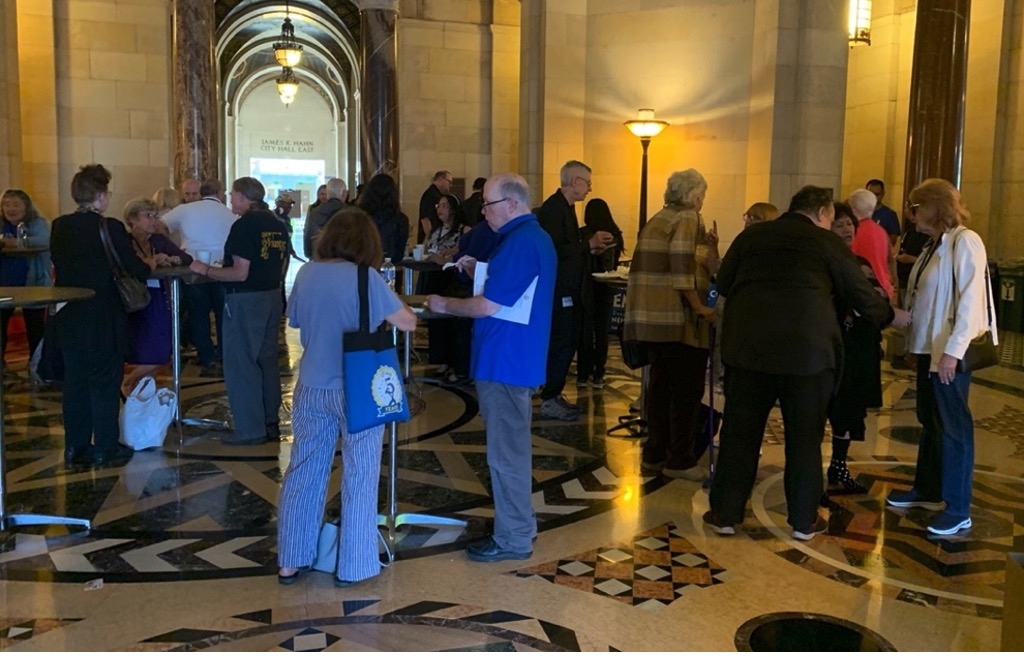Comments
LA CITY HALL - On June 15, 9 AM, the LA City Neighborhood Council Budget Advocates held their first in-person annual Budget Day since 2019.
“Bring Transparency to the City’s Budget Process,” is a theme of the Budget Advocates Mission Statement.
The two keynote speakers of the event elaborated on the theme. They were “The City Watch Dog,” another name for the City Controller Kenneth Mejia, and the Honorable Councilmember for District-3, Bob Blumenfield, Chair of the LA City Budget and Innovation Committee. Both inhouse city servants provided transparency of this year’s unique budget process, while capturing and maintaining the audience’s attention with firsthand experiences and insights.
Controller Mejia seems to embody the duties of his position as the city accountant, auditor, and pay master. “I am the first Certified Public Account (CPA),” he said. “My entire carrier before becoming the City Controller was in finances and accounting.” Interestingly, he pointed out that the candidates he ran against did not have a back ground in finance nor accounting for this crucial job. I wanted to be the Controller because I wanted to use my skills as a CPA and show people [taxpayers] what we [the city] are doing with their tax dollars in a way that is easy to understand and accessible, Controller Mejia said. “I can take a lot of data, say a city document of a thousand pages, and make it accessible that is easy to understand.”
Further, the Controller described the L.A. City Budget Process as being broken for the following reasons: 99% of the budget process takes place behind doors and consumes eleven months of the year to produce little meaningful change. We [City] lack an independent, full-time team w/ financial expertise focused on LA’s fiscal Health. Thus, resulting in no long-term planning to improve services to meet the needs of diverse and changing community and fix our neglected infrastructure.
Controller Mejia spoke in favor of a two-year budget because it would promote longer-term planning, slash thousands of hours of repetitive staff work, create space for up-front goal setting and public participation. Also, it would allow the second year to be devoted to adjustments and capital budgeting, and further, it does not require charter change.

Photo of Budget Day guests enjoying a light breakfast at the L.A City Hall rotunda before the start of the Plenary on the City Budget.
The second Keynote speaker, Councilmember Bob Blumenfield who is serving a second year as Chair of the L.A. City Budget and Innovation Committee had been a member of the budget committee for several years. Council Blumenfield had prior experience with government Budgeting while serving on the California State Assembly served as Chair of the Budget Committee.\
Mr. Blumenfield provided insight on this year’s L.A. City budget process:
This year was different from all the prior years. The biggest budget decision was not made during the budget process, it started earlier this year when we [City Council and Major Bass] negotiated with the police union and decided to increase the police pay for increased recruitment and retention. I was a rational decision to make because a decade ago the goal was to get to 10,000 and the last police chief wanted 12,000 officers. we were losing officers and moving downward in numbers to 8,800, Blumenfield said.
When the L.A. City Police pay for new recruits was compared to the new recruits pay of nearby cities, such as Glendale, Burbank, including Beverly Hills, the LA. City pay of $74,000 was found at the bottom of the compared pay lists, and we wanted new recruits to come in the middle of those pay lists, Blumenfield said. However, “The police contract set a chain of events”.
“Combined with the coalition of unions, that came forward. We decided to make those contracts. We wanted people to be able to live in the city who worked in the city. We wanted labor stability for the Olympics.” Though the increased spendings would stretch out much more than it was projected, this impacted the Budget, he said. “We decided to pay for these increases by not hiring new folks [employees] and cutting positions that were in the books but were vacant.” In the past departments used vacancy rates to pay for overtime because they didn’t have an overtime line-item, he said. Moreover, “The downside of cutting vacancy positions, were very difficult cuts, many programs such as Recreation and Parks would have cut youth programs, but we managed to keep some positions,” he explained.
A few factors that’s causing the budget deficit are: Less State and Federal funding is coming in and our revenue sources are flat, he said.
Lastly. Council Blumenfield provided a snippet on the two-year budget Plan. Budgets are projections, they are evolving documents. I’ am a fan of a two- year budget, if you do it right the second year is about oversight something that we sort of lack. LA City maintains a Quarterly Budget Plan through Fiscal Status Reports, every quarter we go through a process of changing the budget, he said.
(Connie Acosta is a board member of the Los Angeles City Neighborhood Council System and Neighborhood Council Budget Advocates speaking as an individual.)















